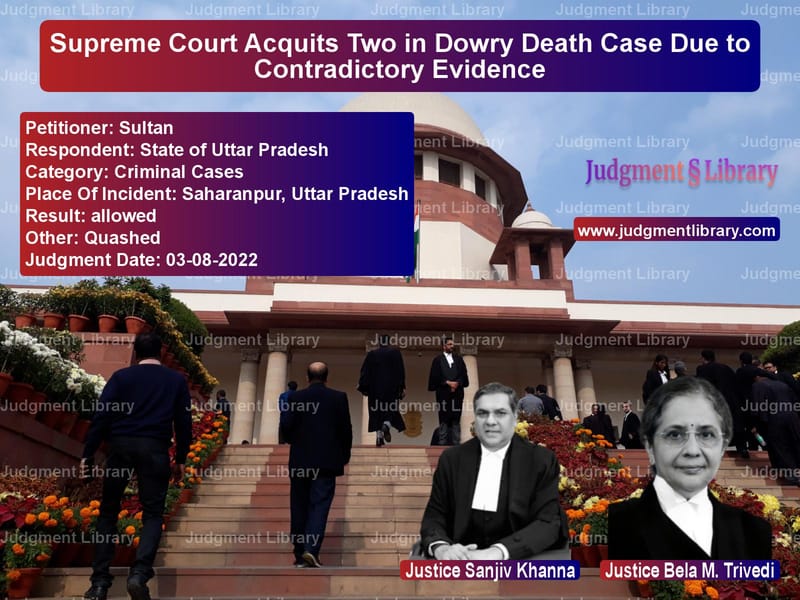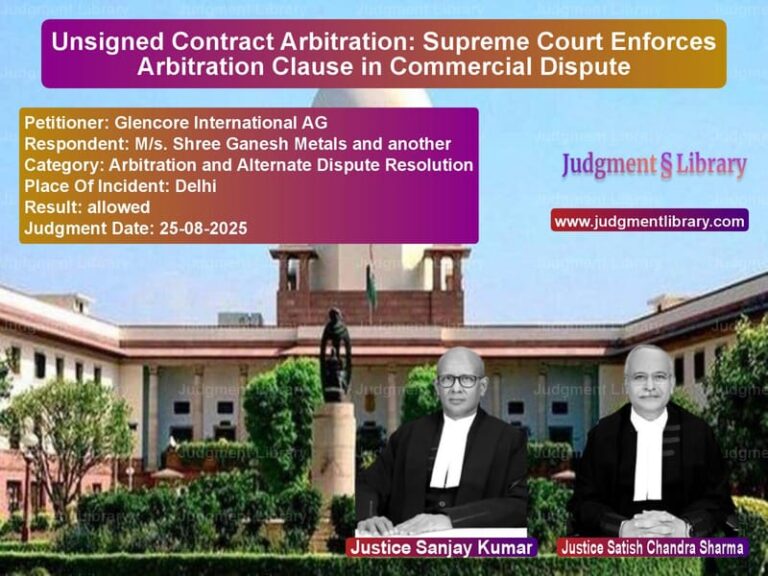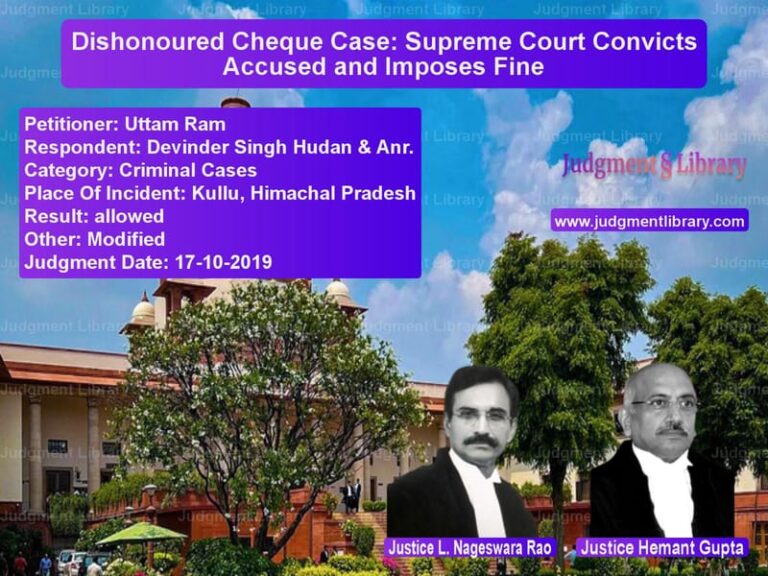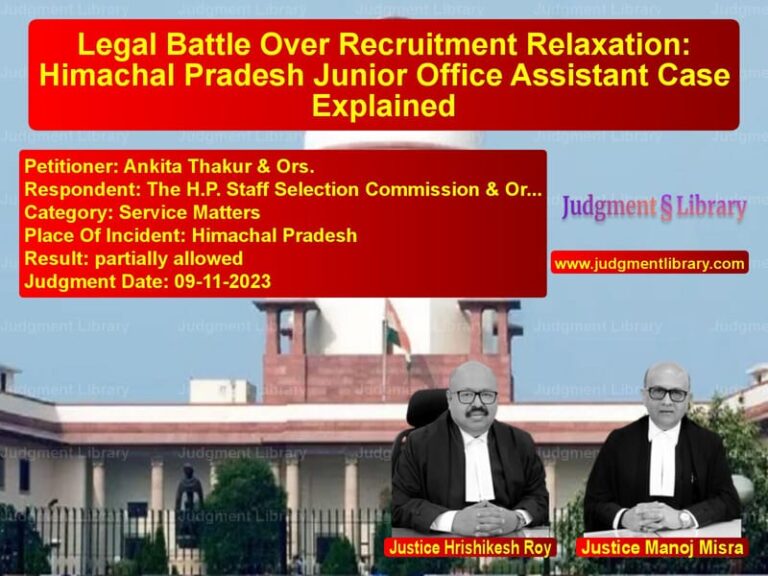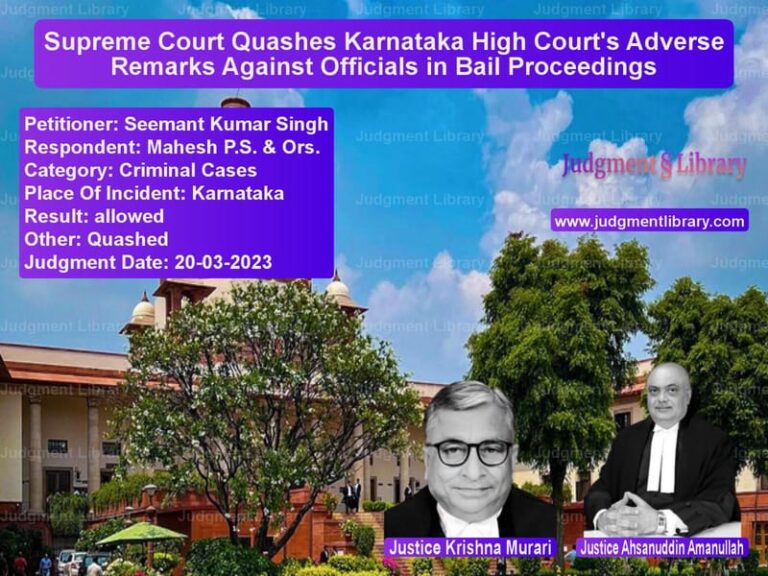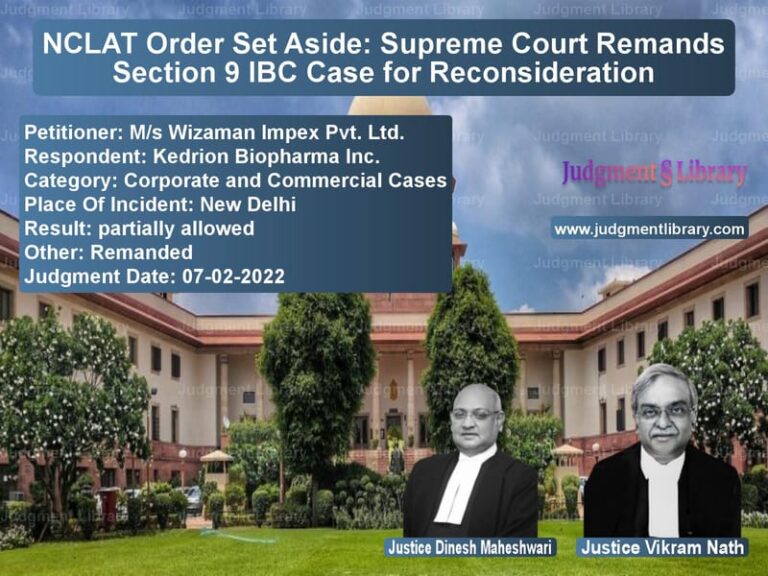Supreme Court Acquits Two in Dowry Death Case Due to Contradictory Evidence
The Supreme Court of India, in Sultan & Anr. v. State of Uttar Pradesh, delivered a significant judgment setting aside the conviction of two individuals accused of dowry-related murder. The Court found major inconsistencies in the prosecution’s evidence, including contradictions in the dying declaration and witness testimonies. This case emphasizes the importance of consistent evidence in securing a conviction in criminal cases.
Background of the Case
The case arose from an incident on May 28, 2011, in Saharanpur, Uttar Pradesh, where Khushboo, the deceased, was allegedly set ablaze by her in-laws. The prosecution accused Noori (the deceased’s sister-in-law), Sultan Akhtar (Noori’s husband), and Rukhsana (Khushboo’s mother-in-law) of pouring kerosene on Khushboo and setting her on fire due to disputes over her character.
Key developments in the case:
- On May 28, 2011, Khushboo was admitted to the hospital with severe burns.
- She gave a dying declaration (Exhibit Ka-3) at 6:20 PM, recorded by Naib Tehsildar Satish Kumar Kushwaha (PW-5).
- The FIR (Exhibit Ka-8) was registered at 10:35 PM the same day, based on a report by her father, Yousuf Ali (PW-1).
- The dying declaration and FIR provided different versions of events, leading to inconsistencies in the prosecution’s case.
- The Allahabad High Court upheld the conviction of Noori and Sultan Akhtar, sentencing them to life imprisonment under Section 302 IPC.
- Noori and Sultan Akhtar appealed the decision to the Supreme Court.
Prosecution’s Case
The prosecution relied on the dying declaration and witness testimonies to establish guilt:
- The dying declaration (Exhibit Ka-3) stated that Noori, Sultan, and Rukhsana had set Khushboo on fire.
- Mirza Hussain (PW-2) and Liyakat Ali (PW-4) testified that Khushboo named her in-laws as the perpetrators.
- The investigating officer, Suresh Babu Itoria (PW-11), supported the prosecution’s version of events.
Defense’s Arguments
Noori and Sultan Akhtar challenged their conviction on the following grounds:
- They were residing separately at Saint Zahria Academy School, several kilometers away from the crime scene.
- Their presence at the scene was not established by any independent witness.
- There were inconsistencies between the FIR, dying declaration, and witness statements.
- The investigating officer failed to mention the dying declaration in the FIR.
- Key witnesses, including Khushboo’s eldest daughter, were not examined in court.
Supreme Court’s Key Observations
The Supreme Court found several discrepancies in the prosecution’s case:
- The FIR, filed hours after the dying declaration, did not mention it, raising doubts about its authenticity.
- Mirza Hussain (PW-2) had initially named additional suspects, including the victim’s husband Ashraf and another individual named Haider, who were never charge-sheeted.
- Independent witness Rashid Naeem (PW-10) did not see Noori and Sultan Akhtar at the scene, contradicting the prosecution’s case.
- The doctor who allegedly signed the dying declaration was not produced as a witness, weakening its evidentiary value.
- The inconsistencies in statements made it unsafe to rely solely on the dying declaration.
Supreme Court’s Judgment
The Supreme Court ruled in favor of Noori and Sultan Akhtar, issuing the following directives:
- The conviction under Section 302 IPC was set aside.
- Noori and Sultan Akhtar were ordered to be released immediately unless required in another case.
- The ruling did not affect the conviction of Rukhsana, who had not appealed.
Impact of the Judgment
This ruling has significant legal implications:
- Reaffirmation of the Importance of Consistency: The case highlights that contradictions in prosecution evidence can lead to acquittals.
- Scrutiny of Dying Declarations: The judgment reinforces that dying declarations must be free from doubt to be the sole basis of conviction.
- Fair Trial Principles: The ruling ensures that individuals are not convicted based on unreliable evidence.
Conclusion
The Supreme Court’s judgment in Sultan & Anr. v. State of Uttar Pradesh underscores the need for consistent and corroborative evidence in criminal trials. By setting aside the conviction of Noori and Sultan Akhtar, the Court reaffirmed the principle that doubts in prosecution evidence should benefit the accused. This ruling serves as a crucial precedent in cases where dying declarations form the primary basis of conviction.
Petitioner Name: Sultan.Respondent Name: State of Uttar Pradesh.Judgment By: Justice Sanjiv Khanna, Justice Bela M. Trivedi.Place Of Incident: Saharanpur, Uttar Pradesh.Judgment Date: 03-08-2022.
Don’t miss out on the full details! Download the complete judgment in PDF format below and gain valuable insights instantly!
Download Judgment: sultan-vs-state-of-uttar-prade-supreme-court-of-india-judgment-dated-03-08-2022.pdf
Directly Download Judgment: Directly download this Judgment
See all petitions in Murder Cases
See all petitions in Bail and Anticipatory Bail
See all petitions in SC/ST Act Case
See all petitions in Judgment by Sanjiv Khanna
See all petitions in Judgment by Bela M. Trivedi
See all petitions in allowed
See all petitions in Quashed
See all petitions in supreme court of India judgments August 2022
See all petitions in 2022 judgments
See all posts in Criminal Cases Category
See all allowed petitions in Criminal Cases Category
See all Dismissed petitions in Criminal Cases Category
See all partially allowed petitions in Criminal Cases Category

